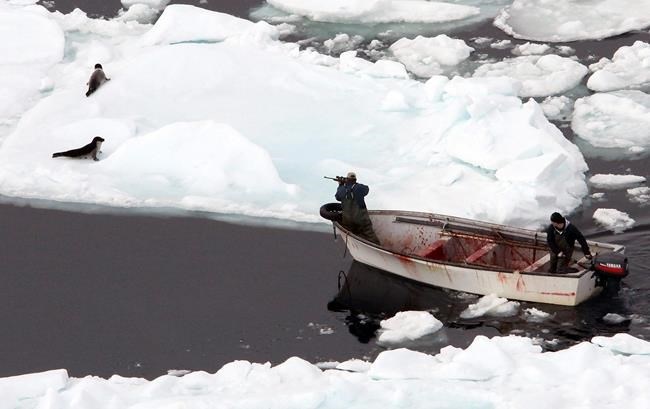William J. Kole

In this March 9, 2010 photo released by the International Fund for Animal Welfare, a seal hunter aims at harp seals in the Gulf of St. Lawrence, Canada. "Huntwatch," a documentary by the organization about the fight to end commercial seal hunts, premieres in September 2016 on Discovery. The producers say it includes grainy but powerful archive footage that had languished in the basement of the group’s headquarters on Cape Cod for nearly five decades.
Image Credit: (Stewart Cook/IFAW via AP)
August 19, 2016 - 8:33 AM
BOSTON - It's not an easy movie to watch: Hunters clubbing seals to death and bloodying the otherwise pristine ice of the Canadian Arctic.
But for the Cape Cod-based International Fund for Animal Welfare, "Huntwatch" — a new documentary about the fight to end commercial seal hunts — is a story that needs to be told.
The film , which premieres next month on Discovery, very nearly was doomed to oblivion. It includes grainy footage that had languished for nearly five decades in the basement of the group's global headquarters in Yarmouth Port, Massachusetts.
"We really just want people to watch the film, look at all sides of the issue, and decide if this hunt still should be happening," said IFAW spokeswoman Kerry Branon, a co-producer on the film.
Indigenous people still harvest seals for food in Canada, but the bloody slaughters chronicled in "Huntwatch" involve white hunters looking to cash in on the pelts of young harp seals and provide for their families.
Despite long-standing bans on the trade in fur and other seal products strictly enforced by the U.S., the European Union and much of the rest of the world, Canada still subsidizes an annual hunt. Animal rights groups are still pressuring the Canadian government to phase out the practice, which was the Cape Cod organization's founding campaign.
Canada's Department of Fisheries and Oceans won't budge, spokesman Frank Stanek told The Associated Press.
"The government of Canada believes in the sustainable use of a renewable resource such as the harp seal," Stanek said, calling the harvest "an important economic and cultural activity." He said officials are "committed to maintaining existing markets for Canadian seal products and supporting the development of potential new markets."
IFAW's Richard Moos, who co-produced the film with Branon, said the seal slaughter ought to have ceased for good many decades ago for the same reason that ended whaling at the turn of the 19th century: There's no longer a viable market for it.
But old traditions die hard.
"It's like trying to get Americans to stop eating apple pie. It's so wrapped up in their identity of being sealers," Moos said.
"Huntwatch" is directed by renowned animal rights activist Brant Backlund and narrated by "Deadpool" actor Ryan Reynolds, a Canadian. It was screened earlier this year at film festivals in New York; Boulder, Colorado; Newport Beach, California; and Middlebury, Vermont.
Discovery and Lionsgate plan to distribute it internationally, starting with a limited theatrical run in New York City and Los Angeles and its premier on Discovery at 10 p.m. EDT on Sept. 22.
"From the get-go, I wanted to make sure the film didn't feel like a one sided propaganda piece," Backlund said in a statement. "The Canadian seal hunt is a very complicated issue with no easy answer."
Another challenge: Toning down the gore.
"Some of the footage in our archive is incredibly disturbing, so we had to find a way to make the film watchable," he said. "We worked very hard at finding lighter moments and human drama, trying to focus in on the characters to tell the story of their experiences around the seal hunt."
"Huntwatch" was culled from more than 3,000 film reels, tapes and photographs in various formats dating to 1969 that documented the Canadian hunts. Branon and Moos found much of it in the cellar around 2009 as they were consolidating their archives on Cape Cod.
"We want to start a conversation," Moos said. "Things are changing. People are waking up."
___
Watch the video online here: https://vimeo.com/136239742
News from © The Associated Press, 2016